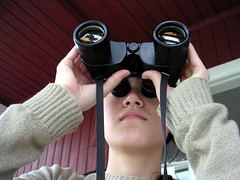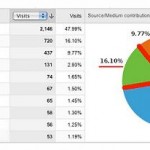My Search Engine Optimization (SEO) Takeaways from Internet Summit 2011

Jessica Bowman, founder and CEO of SEOinhouse, jump started Internet Summit 2011 for me as the first speaker that I heard during Tuesday’s Pre-Conference Intensives. She was a great example of a speaker whose approach is “You’re here to learn, I’m here to teach, let’s get to it!”
In addition to her enthusiasm (an extra important quality in the 8am time slot), she had tremendous knowledge to share. According to Jessica, quality content, now more than ever, is crucial to search engine optimization. (As a content person, I thank you, Jessica Bowman. That’s what I like to hear.)
Jessica reminded us that search results are getting more and more crowded every day. You’ve got to work harder and you have to stay up-to-date on what works and what doesn’t. One point that she spoke on, which was later echoed by Bill Slawski (@bill_slawski), president of SEO by the Sea, is the impact social media has had and will continue to have on SEO.
Jessica’s tips for gaining social authority are:
- Automate minimally
- Associate with people who will share
- Mix up your sharing so you aren’t too predictable
- Do not over expose the message, repeating the same message over and over again.
Later in the day, I attended the “Advanced SEO” session with four speakers. I learned something new from each and every one of them.
Lindsay Wassell (@lindzie), partner and consultant at Keyphraseology, recommended that brick-and-mortar businesses claim their local listings (e.g., establish a presence on Yelp) and then encourage and manage reviews. She also pointed out the increasing importance of posting images. More and more, images are appearing in search results, with and without the related content due to the greater and greater weight search engines are placing on images and videos.
Michael Marshall (@michaelmarshall), lead instructor with Search Engine Academy of North Carolina, spoke about the difference between on-page and off-page optimization. On-page optimization includes the steps you take to optimize your webpage as you are building it including title tags, alt tags, header tags (H1, H2), keyword density and keyword proximity, sitemaps (XML and HTML), usability and internal linking. (Note: Some of these factors are not used appropriately today.) Components of off-page optimization include your activity, presence and mentions on social networking sites, search engine/directory submission, social bookmarking submissions (digg.com, de.li.cious.com) and article submissions. I had not heard of that division – on-page and off-page – and I appreciated the breakdown.
Markus Renstrom (@markusrenstrom), Head of SEO at Yahoo!, said that SEO is:
- content strategy
- accessibility
- relevance architecture
- user focused
Well, I liked everything that Markus had to say since he puts such high importance on content strategy and because he had the best accent – helps break up the day when you’re listening to speakers for 9 hours straight.
The slide from Bill Slawski that made me think the most was:
Google+ > Twitter + Facebook
I love Twitter, I enjoy Facebook, but I’ve really been dragging my heels on Google+. Looking ahead to where search and social are headed, his equation make complete sense. If you’re not on Google+ now, you better get busy and join. (Look me up when you do…I’ve got some Google+ homework to do.)
Bill closed with a recommendation that really resonated with me as I start up a couple of new projects. Something I knew, but is always good to hear the experts reinforce: Teach and coach clients how to social network instead of networking for them. They are the subject matter experts. It’s more authentic when the content comes directly from them. Authenticity is very, very good for search engine optimization.
So… what was the best search engine optimization (SEO) insight you gained from Internet Summit 2011?
